上海初三英语中考知识点整理
上海中考英语各语法点基础考点归纳

冠词一、固定词组1. 有些固定词组中有the : in the middle of, go to the cinema/ movies, play the violin/ piano/ guitar, in the end, the same2. 有些词组中不用任何冠词: by bus, play football, play chess, go to school, go to bed, at first, lose weight3. 有些词组中加a: catch a bus, in a hurry, take a walk,二、专有名词前1.国家、城市等专有名词前不加the : Shanghai, in New York, in America, 但是 the United Sates 要加 the2. 由普通名词构成的专有名词前加the Great Wall,3. 江河、海洋、山川前加the: the Yangtze River, the Pacific, the Yellow Mountains三.一日三餐、四季、一星期七天及十二个月,next前不加任何冠词1. for breakfast/lunch/supper2. in spring/ summer /autumn /winterMonday /Tuesday /Wednesday /Thursday /Friday /Saturday / Sunday,February,March,April,May,June,July,August,September,October,November,Dec ember四、宇宙中独一无二的事物, 序数词, 形容词最高级,only所修饰的名词前用the1. the sun, the moon, the earth2. the eighth, the twelfth, the twentieth, the fourth3. the biggest, the most popular4. the only key五、形容词加the, 表示这一类人the blind, the deaf, the old, the rich, the poor六、单词前面用“an”还是“a”取决于单词开头的读音是否是原音1. a: a useful dictionary, a university student, a European village, a one-eyed captain, a uniform2. an: an hour, an honest girl, an e-mail, an important letter, an exchange student, an unclean X-ray photograph, an MBA course,There is __an __”f” in the word “first”. f, h, l, m, n, s, x, r,介词分类记忆:一、时间介词具体哪一天on, 几点钟前用at, 年、月份前用in, 早上、下午、晚上用in, 但是具体某一天的早上、下午、晚上用on;last, next, this, that, some, every等词之前一律不用介词On Christmas Day, on December 14, 2013, on the morning of December 15,二、地点介词三、短语中固定搭配的介词care for, based on, in one’s thirties, concentrate on=focus on , the answer to the question, the key to the door, She is of average height, share with, be responsible for, add…to,四、方式介词by, with by bus, by train , by e-mail, by express mail, by credit cardwrite with a pen, say it in English五、表示形容词、副词比较范围的of/ among + 代词,名词或数词, in+ 表示地点或集体的名词John was the first on the list of the famous stars because he was the richest ______ them.代词一、人称代词1.顺序:单数:二、三、一复数:一、二、三John sits among ______, _______ and me.A. Mary…youB. she…youC. you…MaryD. you…she2.主格宾格:主格——主语, 宾格——宾语动词或介词后The journalist interviewed ________. he, his, himI show_______ around the city. they, their, them3. 名词性物主代词The cinema in our neighborhood is old and small, but ______ is big and modern.they, them,. their, theirsMum, have you ever seen Danny’s sports shoes I want a pair like _______. he a friend of mine/ his/ my father’sI ______ we______ you_______ he_______ her________ they_______4、反身代词enjoy oneself , help oneself to sth, learn…by oneself= teach oneselfI made it myself.I ______ we______ you_______ he_______ her________ they_______it________不定代词other, others, another, the othersSome…._______ One…_________another + 可数名词的单数固定词组一个接着一个 _________________Will you please show me _________ oneHave _______ try, and you’ll succeed.2.形容词修饰不定代词、形容词后置something necessary, neither______, both______, all_______, none________The report says __________ of the two countries in Asia supports the war. After you get off the bus, you can take ________ of the two Metro Lines to Zhongshan Park.either side both sides, a few, little, a littleIt’s unusual for him to be so active because he is often a boy of _______ words.A. fewB. littleC. manyD. much数词1、two hundred/ thousand, hundreds/thousands of , 前面如果有more than, less than , over, about 等词时,用确切的数据 about/ more than two hundred people2、数字的读法, 百位和十位之间用and 3653、序数词的拼写One_______ , two__________, three_________ Four________, five________, eight_________, twelve________, nine_______, twenty_________,twenty-one_____________5.分数1/2____________ 2/3__________, 3/ 4_________, 3/5_________6、百分比 30 percent7、日期表达 February 12,1809two hours and a half =two and a half hoursa ten-year-old boy The boy is ten years old.He is over fifty years old. He is in his fifties.It’s ten minutes’ walk. It’s a ten-minute walk.名词1. 变复数potato______ tomato______ hero______ Negro_______ photo______两人两菜加s, 其他加esboy______ toy_________, dictionary_________, 只有辅音+y 结尾变y为ies beach___________s, x, ch, sh,结尾的名词复数+eslife, thief ,leaf, knifefe, f结尾的名词, 把f, fe变为ves2. 可数名词与不可数名词many children much informationa few books a little timesome boys some timea couple of days a basket of fruit修饰可数名词的: few, a few, many, a large number of, a couple of修饰不可数名词的: little, a little, much, a great deal of, huge amounts of 既修饰可数名词的,又可以修饰可数名词的: plenty of , a lot of/ lots of , some 3. 名词所有格my father’s friend= a friend of my father’s, the teachers’ office, the Children’s Palace形容词/ 副词1、形容词的用法:1系动词后做表语 The comedy is very funny2在名词前作定语 It’s a funny comedy3修饰不定代词在不定代词之后 There is something wrong with my watch.4在宾语之后作宾语补足语 The good news made Bob’s mother excited.You’d better keep the window open.2、副词的用法:1修饰行为动词 He drives carefully.2修饰形容词 The food is quite delicious.3修饰整个句子 Luckily, he still got the first prize3、much, far, a little, a bit, a lot, even等词修饰形容词比较级The Bund looks much _________ at night. prettyHe looks a little __________happy4. 既是形容词又是副词的:early ,fast, hard, high , late5、as…as not as/ so…as句型中间用形容词或者副词的原级, 所以可以先排除比较级和最高级,选副词还是形容词,看是否修饰行为动词The driver drove as ___________ as usual.A. most carefullyB. more carefulC. carefulD. carefully6、一些特殊句型The 比较级主语+谓语, the 比较级主语+谓语,The earlier…, the better…the fastest in our class, one of the longest rivers, the second longest river, better and better疑问词How far ten minutes’ walkHow soon in ten minutesHow fast a mile in ten minutesHow long for ten minutesHow often twice a dayHow many twoHow much two yuan/two kilos1. He went to the hospital to have a checkup on eyesight. 99______ ______ he go to the hospital2. We have a class meeting once a week. 00______ ______ did the American spacecraft Galileo travel and work in space 3. This sign means cars and buses mustn’t turn right here. 04______ ______ this sign mean4. London held the first World Expo in 1851. 05______ did London ______ the first World Expo5. The students’ projects will be on show in three days. 06______ ______ will the students’ projects be on show动词连系动词:动词 2.感官动词:feelfeel-felt-felt, smellsmell-smelt-smelt, taste, sound, look3.表示变化的: become-became-become, get-got-got, grow-grew-grown, turn4. 表示保持的:keep, stay, remain5. 似乎是seem情态动词:May I watch TV No, you mustn’t/ may not/ can’t.Must I do the work No, you needn’t.may be 可能是 must be 一定是can’t be 不可能是You needn’t help him.= You don’t need to help him.1. We ______ keep the new traffic law and learn how to protect ourselves. 04A mayB shouldC canD need2. A: ______ I fill in the check-in form right now, sirB: No, you needn’t. You can complete it this afternoon. 05A MayB CanC WouldD Must3. My mother ______ make rice dumplings. She’ll teach me how to do it. 06A mustB needC shouldD can使役动词:make, let, have sb. do sth.动词的时态和语态:一般现在时主语+do/ does1、表示现在经常或反复发生的动作或存在的状态,常和often , always,usually ,sometimes, everyday 等时间状语连用;2、表示客观事实或普遍真理;The sun rises in the east.3、由when, before, after, if, unless, as soon as 引导的从句,主句用将来时从句用一般现在时I will tell him as soon as he comes back.一般过去时主语+did1、常和表示过去的时间状语连用,如yesterday, last week, three years ago , in 1987, at the time , in the past2、过去习惯性动作 used to do一般将来时 will/ shall do1、shall, will + 动词原型构成一般将来时;2、am is , are going to + 动词原型,表示近期打算去做的事情或可能要发生的事情;there is going to be3、表示“去向”的动词,可以用进行时表示将来时 come, go, arrive, leave, leaveforI’m leaving for Beijing the day after tomorrow.现在进行时 am/ is/ are + doing常用时间状语now, at present , for the time being, look, listen, be careful Look, Jane’s grandma ________ with some aged people.A. dancesB. dancedC. is dancingD. was dancing过去进行时 was/ were + doing常用时间状语 at that moment, this time yesterday, at six yesterday morning, from two to three yesterday afternoon.也常用于when 和while引导的时间状语从句When I was having dinner with my family last night, the telephone rang.现在完成时 have/ has + done1.常用的时间状语和副词: never, ever, already, yet, just, recently, so far, up to now, in the past 10 years.2. already & yetI have already read the book, 改否定句I _____ read the book _____.3. since&forI have learned English since 2004 对划线部分提问I have learned English for 10 years 同上4. 延续性动词和瞬间动词I______ this book for a week.A. have boughtB. have hadC. boughtD. buy现在完成时 had + done1.表示过去的过去, 常用的时间状语:by the end of last year, before I entered the school2. 用于主句为一般过去时的宾语从句中He told me that he had been to China twice.被动语态:1.构成:be+及物动词的过去分词2. 时态的变化主要体现在be 的变化一般现在时 am/ is/ are+, 一般过去时was/were+现在完成时 has/ have been + 一般将来时will be +情态动词should/ may/ must/ can/ could… + be+ p. p3. 先划出句子的谓语部分———写出动词原形——判断时态——注意主语的单复数Jane wrote several articles about memory last month.Several articles about memory ____ ____ by Jane last month.————2. write—wrote—written——3. was/ were written——4. 主语是several articles , 因此是were written非谓语动词1——动词不定式1. 主语 To be a teacher is my dream2. 宾语 I want to buy a new bike3. 表语 My father’ s job is to make sick people better.4. 定语 We have got a new project to do5. 宾语补足语 Our headmaster asked us to work hard6. 动词不定式作形式主语 It is difficult to learn English well7. 动词不定式作宾语的动词常见的有:ask, want, tell, agree, advise, decide, plan, promise, refuse, hope, fail8. 宾语从句改成简单句I don’t know what I can do nextI don’t know _____ ______ do next.9. 有些动词后作宾补省略to一感feel, 二听listen to, hear, 三让make, let, have, 四看see, watch, notice, observe非谓语动词2——动名词1. 主语 Smoking isn’t allowed in public places2. 宾语 Tom enjoys traveling around the world.3. 表语 My hobby is collecting stamps4. 动名词作宾语的动词 enjoy, finish, keep, mind, spend, go, practise.反意疑问句1、划出句子中的谓语部分You could hardly believe the news,____ _____情态动词有: can, could, may, must, should, need, shall, will, would, ought to2、有些动词的过去式与原形同形cost,set, cut, put, set, fit, read, spread The bad news spread fast, ____ _____3、有些词表示否定的意思little, never, seldom, hardly, rarely, few, none, nothing4、判断现在完成时,过去完成时,看后面有没有过去分词He has a little of milk for his breakfast, _____ _____Jack has never been to Guangzhou, _____ _____5、反意部分只能用代词,不能用名词,先画出主句部分的主语,再判断代词用什么; Your mother has never tired of shopping, _____ ____Jim’s parents are never late for their work, ____ ____The bad news spread fast, ____ _____6、特殊的反义疑问句You’d better finish your homework, _____ _____谓语动词had better do, 后面反意部分仍用助动词hadLet’s go sightseeing on Christmas Day, _____ ____Close the door, ____ _____Don’t open the window,______ ______is little time left, ______ ________Excises:1. You could hardly believe the news,____ _____2. Your mother has never tired of shopping, _____ ____3. The coat cost John a month’s pay, ______ _____4. Jim’s parents are never late for their work, ____ ____5. The lady always has a cup of tea after dinner, _____ ____6. The professor will give us a lecture on the effect of green house next Monday, _____ _____7. There is little time left, ______ ________。
上海中考英语复习八大时态

上海中考英语复习-八大动词时态一、一般现在时1、结构肯定式:主语+ am /is/are +其他否定式:主语+ am/is/are +not + 其他一般疑问句式:Am /Is /Are + 主语+ 其他简略回答: 肯 Yes,主语 + am/ is /are 否No,主语+am/is/are not肯定句式: 主语+动词原形/动词的第三人称单数+其他否定句式: 主语+助动词 don't/doesn't +动词原形+其他一般疑问句式: Do/Does+主语+动词原形+其他简略回答: 肯Yes,主语+do/does 否No,主语+do/does not缩写形式: don't = do not doesn't = does not2、用法1表示经常的或习惯性的动作,常与表示频度的副词连用;常用的频度副词有:always、often、 usually、seldom、never、sometimes, every week day, year, month…, once a week, on Sundays;频度副词在句中通常放在行为动词之前,系动词、助动词之后;例如: He often goes swimming in summer.他夏天经常游泳;I usually leave home for school at 7 every morning. 每天早上我七点离开家;2表示现在的状态;例如:My father is at is very busy. 我父亲在工作,他很忙;The boy is twelve. 这男孩十二岁;3表示主语具备的性格、特征和能力等;例如:All my family love football .我全家人都喜欢足球;My sister is always ready to help others . 我妹妹总是乐于助人;Ann writes good English but does not speak well. 安英语写得不错,讲的可不行;4表示客观真理,客观存在,自然现象;例如:The earth moves around the sun. 地球绕太阳转动;Shanghai lies in the east of China. 上海位于中国东部;5表示按计划或安排好的,或将要发生的动作,可用一般现在时表将来;但只限于start,begin,leave,go,come,arrive,return,take place等瞬间动词;例如:The train leaves at six tomorrow morning. 火车明天上午六点开;He comes back tonight. 他今晚回来6在复合句中,当主句是一般将来时,时间或条件状语从句的谓语动词只能用一般现在时来表示将来要发生的动作;例如: I'll tell him the news when he comes back. 他回来时,我将告诉他这个消息;If you take the job , they will talk with you in greater details.如果你接受这份工作,他们将和你谈谈细节;3、当主语是第三人称单数时,谓语动词需加-s或-es:注意:动词have的第三人称单数是has.写出下列动词的单数第三人称形式;1. cook _______6. enjoy ______ 7 go _________ 8 receive ______ 9 cry______ 10. close ________11. drive _______ 12. choose ______ 13. play ________ 14. reach ________二、一般过去时1、结构肯定式:主语+ was/were +其他否定式:主语+ was/were +not + 其他一般疑问句式: Was/Were + 主语+ 其他简略回答: 肯 Yes,主语 + was/were 否No,主语+ was/were not肯定句式: 主语+动词过去式+其他否定句式: 主语+助动词didn’t +动词原形+其他一般疑问句式: Did+主语+动词原形+其他简略回答: 肯Yes,主语+did 否No,主语+did not2、用法1)表示过去某个时间所发生的动作或存在的状态;常和表示过去的时间状语yesterday, just now, the other day, in 1982, ago, an hour ago, long long ago, the day before yesterday, last weekyear, night, month…, at the age of 5, one day, once upon a time等连用;在一般过去式中,要表达“过多少时间之后”,一般用after;例如:Where did you go just now 刚才你上哪儿去了After a few years, she started to play the piano.几年后,她开始弹钢琴;2)表示在过去,经常或反复发生的动作;常与often,always等表示频度的副词连用,且有明确过去的时间状语;例如:When I was a child, I often played football in the street.我是个孩子的时候,常在马路上踢足球;3)一般过去式也可与today,this week,this month,this year等表现在的时间状语连用,但这些时间状语须指过去的时间,决不包含“现在”“此时此刻”的意思;例如:Did you see him today今天你看见他了吗3、动词过去式变换规则三、一般将来时1、结构肯定句式:主语+助动词will+动词原形+其他否定句式:主语+助动词will+动词原形+not+其他一般疑问句式:助动词Will+主语+动词原形+其他简单回答:在口语中,will在名词或代词后常缩为’ll,Will not常简缩为won’t;在疑问句中,主语为第一人称时I和we时,常用助动词shall;例如:She’ll go to play basketball. 她要去打篮球;Shall we go to the zoo 我们要去动物园吗肯定句式:主语+be going to +动词原形+其他否定句式:主语+be not going to +动词原形+其他一般疑问句式:Be+主语+going to+动词原形+其他简略回答:肯Yes,主语+be 否No,主语+be not2、用法1)表示将来某个时间要发生的动作或存在的状态,常与tomorrow, next dayweek, month, year…, soon, in a few minutes, by…, the day after tomorrow等连用;例如:I'll meet you at the school gate tomorrow morning.2表示将来经常或反复发生的动作;例如:I’ll come and see you every Saturday next year.明年我将每个星期六来看你;3表示说话人对于将来的看法、假设和推测,通常用be afraid,be/feel sure,hope,know,think等后面的从句或与副词perhaps,possibly,maybe等连用;例如:I think she’ll go back home for supper. 我想她会回家吃饭;Maybe she’ll go to the gym.也许她会去体育馆;4be going to +不定式,表示将来;①表示主语进行某一行动的打算意图;这种打算常经过预先考虑并含有自己做好某些准备的意思;即计划,安排要发生的事;例如:What are you going to do tomorrow 明天打算作什么呢The play is going to be produced next month;这出戏下月开播;②表示说话人确信如此或有某种迹象表明某事即将发生;例如:Look at the dark clouds, there is going to be a storm. 看那乌云,快要下雨了;5注意:be going to 和will之间的区别;①两者都用于预测时,be going to意指有迹象表明某件事将要发生,属客观的推测;will 则意指说话人认为/相信某件事将要发生,属主观的推测;②两者在时间的发生上,be going to通常表示马上要发生或相当快就要发生的事情;而 will不指明任何具体时间,可以指遥远的未来;例如:He is gong in to be better. 他的病就要好起来了;He will be better. 他的病会好起来了;③两者都表示意图时,be going to含有预先计划、准备的意思;will则指未经过预先思考或计划,是临时的一种决定;④在条件状语从句中,be going to表将来,will表意愿;例如:If you are going to make a journey, you'd better get ready for it as soon as possible.如果你将要去旅行,最好尽快做好准备;Miss Gao will tell you the answer if you ask her.如果你去问高老师,她会告诉你答案;6be +不定式表将来,表示客观安排或受人指示而将要做某事;例如:We are to discuss the report next Saturday.我们下星期六讨论这份报告;7be about to +不定式,意为马上做某事;不能与tomorrow, next week 等表示明确将来时的时间状语连用;例如:He is about to leave for Beijing. 他马上要去北京;巩固练习:1. Mrs. Brown is going to buy a digital camera. 对划线部分提问________________________________________________________boss is going to fly to London on business the day after tomorrow. 用often改写句子____________________________________________________will visit Brazil next week. 变成一般疑问句并否定回答________________________________________________________4. 他们今晚要去看足球赛;________________________________________________________5.金一家人什么时候去长城啊_______________________________________________________四、过去将来时1、结构:would/should+动词原形 was/were going to+动词原形2、用法:1 表示从过去某时看将要发生的动作或存在的状态,常用于主句是一般过去时的宾语从句中;例如:He said that he would finish his work before 9 o’clock.他说他会在九点之前完成工作;2 表示过去的某种习惯,只要would;例如:Whenever he has been in trouble,we would give him a hand.每当他遇到困难时,我们总会伸出援助之手;巩固练习:1、He said that he comeback tonight.2、I thought it rainsoon.五、现在进行时1、结构:am/is/are+动词的现在分词2、现在进行时的用法:1表示现在指说话人说话时正在发生或进行的动作;常与now,right now,at this moment等时间状语连用;例如: We are waiting for you now. 我们正在等你;2表示现阶段说话前后一段时间内,一直在进行的活动;说话时动作未必正在进行;例如:Mr. Green is writing another novel.他在写另一部小说;说话时并未在写,只处于写作的状态;He is thinking about this problem.这些天来他一直在考虑这个问题; 3表示反复发生的动作或持续存在的状态,常与always, constantly, forever 等词连用,往往带有说话人的主观色彩;例如:You are always changing your mind. 你老是改变主意;4表示渐变,这样的动词有:get, grow, become, turn, run, go, begin等;例如:The leaves are turning red. 叶子在变红;It's getting warmer and warmer. 天越来越热了;5表示按计划或安排要发生的动作;表移动的终止性动词come, go, arrive, leave, start, begin, return等用于现在进行时,表示即将要发生动作;例如:I'm leaving tomorrow. 明天我要走了;The train is arriving soon. 火车要到了;3、V-ing变换规则写出下列动词的现在分词形式;1、win2、relax3、jump4、make5、have6、talk7、tie8、cheer9、enjoy 10、cry 11、come 12、fit巩固练习1、Bruce often writes letters in English. 用now改写句子________________________________________________________2、They are surfing. 对划线部分提问________________________________________________________3、瞧,那些孩子们玩的真高兴________________________________________________________用所给动词的正确形式填空;1. Uncle Wang usually _______ go to work by bike.2. Be quiet The patient ____________ sleep.3、Look, a number of Young Pioneers _______________plant trees over there.4、Emily often _______ help her mother _________ wash clothes on Sunday.5、______ not be afraid, I ____________ show you how to reach the station.6、What ______ you ______________ do the day after tomorrow7、There ________ be an important meeting in two days.8、My aunt join the Party in 1995.六、过去进行时1、构成:was/were+动词的现在分词--ing2、用法:1)表示在过去某时刻正在进行或发生的动作,通常与表过去的时间状语连用;例如:At this moment yesterday, I was packing for camp.昨天这个时候,我正在收拾东西去露营;2)表移动的动词,如come, go, arrive, leave, start, begin, return等词的过去进行时,可以表示过去将要发生的动作;例如:She told me that she was going to Hainan for her holiday. 她告诉我她将去海南度假;3)在含有时间状语从句的复合句中,表示一个过去的动作发生时或发生之后,另一个动作正在进行;例如:It was raining when they left the station. 他们离开车站时,正下着雨;When I got to the top of the mountain, the sun was shining. 我到达山顶时,阳光灿烂;4)在叙述或描写过去的事情时,过去进行时经常与其它过去时态,特别时是一般过去时连用;但是过去进行时往往是表示背景;例如:One night, he was typing in his study . Suddenly , a man broke into his house and cut off the electricity … .一天晚上,他正在书房里打字;突然,一个人闯进屋来,切断了电源……巩固练习:1、Mary ___ a dress when she cut her finger.A. madeB. is makingC. was makingD. makes2、As she ___ the newspaper, Granny ___ asleep.A. read;was fallingB. was reading; fellC. was reading; was fallingD. read;fell七、现在完成时1、构成:助动词have/has+动词的过去分词2、现在完成时的用法1表示过去发生或已经完成的动作对现在造成的影响或结果,常与already, yet, ever, never, just,before 等词连用;例如:Have you ever cooked at home 你吃晚饭了吗You have already grown much taller.你已经长高了许多;2表示过去已经开始,持续到现在的动作或状态,并可能还要延续;往往和表示一段时间的时间状语连用,常用的有:for+一段时间;since+过去时间点或从句;Since 用来说明动作起始时间,for用来说明动作延续时间长度,提问用How long.例如:It has been five years since he joined the army .他参军五年了; They have learned English for eight years .他们已学了八年的英语了;3 现在完成时需注意的问题:①表示短暂性的动词不能与表示一段时间的状语连用appear,begin,borrow,lend,buy,close,come,die,fall,find,finish,join,kill,leave,sell,stop等;例如:He has joined the army for five years. 错误He has been in the army for five years.正确②非延续性动词的否定形式可以与表示延续时间的状语连用;即动作不发生的状态是可以持续的;例如:I have received his letter for a month.错I haven't received his letter for almost a month. 对③不能和明确的过去时间状语连用,如:yesterday,last week,in 1998,two daysago等;4have/has been to 和have/has gone to 的区别:have/has gone to:是说去某地方了,即在那个地方或者是在去那个地方的途中Have/has been to:去过什么地方,即现在已经不在那个地方了例如: has gone to Lanzhou 去了兰州现在在兰州或者在去兰州的路上I have never been to Beijing去过北京现在已经不在北京了3、过去分词的变换:过去分词的规则变化与动词过去式的变化相同,在动词词尾加-ed;不规则变化的过去分词见教科书末页不规则动词表;写出下列动词的过去分词形式;1、bring2、catch3、do4、find5、eat6、get7、forget8、cut9、pay 10、know 11、buy 12、see13、come 14、sleep 15、spend 16、tell4、比较一般过去时与现在完成时①一般过去时表示过去某时发生的动作或状态,强调动作,不和现在发生联系,常与具体的过去时间状语连用,如yesterday, last week,…ago, in1980, inOctober, just now等;②现在完成时表示过去发生的某一动作对现在造成的影响或结果,强调的是现在的情况,不能与表过去的时间状语连用;例如:I saw this film yesterday. 强调看的动作发生过了I have seen this film. 强调对现在的影响,电影的内容已经知道了Why did you get up so early 强调起床的动作已发生过了He has been a League member for three years. 强调他是团员巩固练习:1、-Do you know our town at all-No, this is the first time I ___ here.A. wasB. have beenC. cameD. am coming2、-Have you ____ been to our town before-No, it's the first time I ___ here.A. even, comeB. even, have comeC. ever, comeD. ever, have come3、Do you know ________A. how long has he lived hereB. how long he has lived hereC. he has lived here how longD. he has lived how long here八、过去完成时、1、构成:助动词had+动词过去分词2、用法:1表示在过去某一时间或动作以前已完成的行为或存在的状态;即发生的时间是过去的过去;常与“by/before+过去时间”构成的短语连用;例如:The train had already left before we arrived. 在我到达之前,火车已经开走了;He said that he had learned some English before. 他说过他以前学过一些英语;2表示在过去某一时间点之前已经持续了一段时间的动作或状态,常与for/since 引导的表示过去的时间状语连用;例如:I had lived in America for two years before I came here .我来这之前在美国住过两年;3表示过去未曾实现的计划、愿望等;这种用法中常用的动词为hope, want,plan,wish, expect, think, intend, mean, suppose等;例如:We had hoped that you would come, but you didn't.那时我们希望你能来,但是你没有来;I had thought that all knew about it.我以为他们都知道这件事呢;巩固练习:1. You don't need to describe her. I ___ her several times.A. had metB. have metC. metD. meet2. ---I'm sorry to keep you waiting.---Oh, not at all. I ___ here only a few minutes.A. have beenB. had beenC. wasD. will be3、The students ___ busily when Miss Brown went to get a book she ___ in the office.A. had written, left B,were writing, has leftC. had written, had leftD. were writing, had left4、My dictionary ___, I have looked for it everywhere but still___ it.A. has lost, don't findB. is missing, don't findC. has lost, haven't foundD. is missing, haven't found.。
上海中考英语各语法点考点归纳
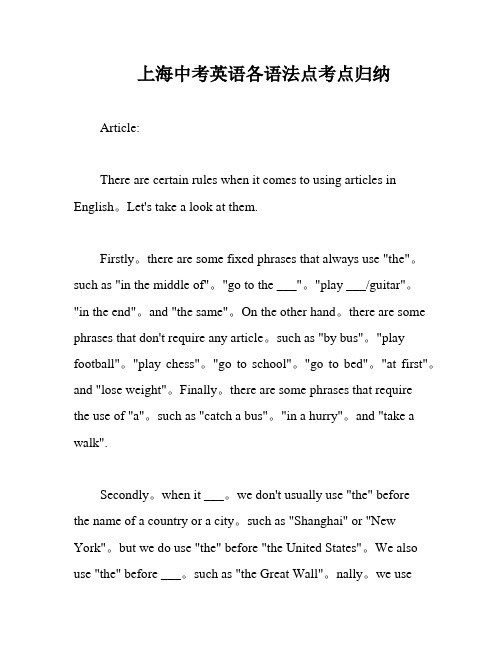
上海中考英语各语法点考点归纳Article:There are certain rules when it comes to using articles in English。
Let's take a look at them.Firstly。
there are some fixed phrases that always use "the"。
such as "in the middle of"。
"go to the ___"。
"play ___/guitar"。
"in the end"。
and "the same"。
On the other hand。
there are some phrases that don't require any article。
such as "by bus"。
"play football"。
"play chess"。
"go to school"。
"go to bed"。
"at first"。
and "lose weight"。
Finally。
there are some phrases that requirethe use of "a"。
such as "catch a bus"。
"in a hurry"。
and "take a walk".Secondly。
when it ___。
we don't usually use "the" beforethe name of a country or a city。
上海初三英语知识点

上海初三英语知识点一、动词不定式1. 构成:动词不定式由“to + 动词原形”构成。
2. 用法:a) 作主语:动词不定式作主语时,句子的谓语动词常用单数。
如:To get there by bike will take us half an hour.b) 作宾语:后面能接不定式作宾语的动词有:agree,ask,choose,decide,forget,hope,learn,want,wish,would like等。
如:We hope to get there before dark.c) 作宾语补足语:有些动词既可跟不定式作宾语,也可跟动名词作宾语,但含义不同。
如:remember to do(记住要做某事);remember doing(记得曾经做过某事);forget to do (忘记要做某事)。
二、感官动词1. 五个感官动词:look,sound,taste,smell,feel。
2. 用法:感官动词后接形容词,如:The music sounds good.三、变化动词1. 变得:become,get,grow,turn等。
2. 不变:stay,remain,keep等。
四、代词1. 单数:both,either,neither,all,every,none等。
2. 复数:yours,ours,theirs等。
五、情态动词1. 可能性:can,may,might,could等。
2. 能力:can,be able to等。
3. 允许:can,may等。
4. 建议:can,may,could等。
六、疑问词1. 常用疑问词:what,how,why,where,when,who,which等。
2. 特殊疑问词:how often,how soon,how long,how much等。
七、时态1. 一般现在时:表示习惯动作或现在事实。
2. 一般过去时:表示过去发生的动作或事实。
3. 一般将来时:表示将来要发生的动作或事实。
沪教版初三英语复习知识点全集
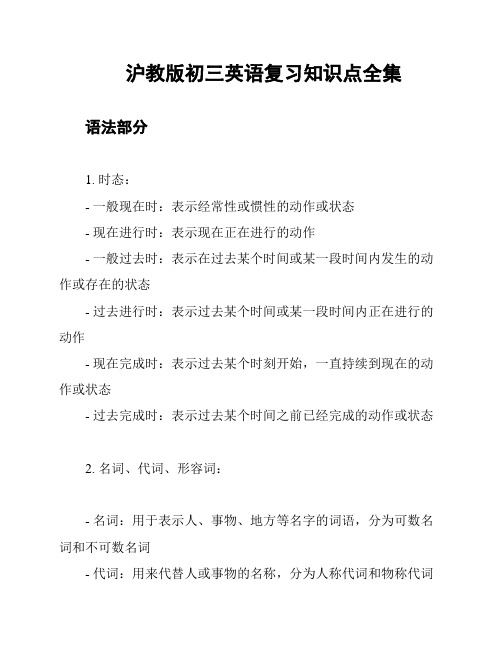
沪教版初三英语复习知识点全集语法部分
1. 时态:
- 一般现在时:表示经常性或惯性的动作或状态
- 现在进行时:表示现在正在进行的动作
- 一般过去时:表示在过去某个时间或某一段时间内发生的动作或存在的状态
- 过去进行时:表示过去某个时间或某一段时间内正在进行的动作
- 现在完成时:表示过去某个时刻开始,一直持续到现在的动作或状态
- 过去完成时:表示过去某个时间之前已经完成的动作或状态
2. 名词、代词、形容词:
- 名词:用于表示人、事物、地方等名字的词语,分为可数名词和不可数名词
- 代词:用来代替人或事物的名称,分为人称代词和物称代词
- 形容词:用量词修饰的词语,用于给人或物加以描述
3. 副词、介词、连词:
- 副词:用来修饰动词、形容词等词语,表示时间、地点、程度、方式等
- 介词:用来表达方位、时间、动作、比较、原因等含义
- 连词:用来连接并列分句、并列词组等
阅读部分
1. 阅读技巧:快速寻找主题句,了解段落大意,找到重点词汇,理解词汇的上下文含义。
2. 阅读题型:
- 主旨大意题:考查对段落大意的理解
- 细节理解题:考查对细节信息的理解
- 推理判断题:考查对文章的推理能力
- 下文内容预测题:考查对文章描写情节的把握程度
写作部分
1. 写作技巧:连贯、清晰、有条理,使用句型和词汇丰富的表达方式。
2. 写作题型:
- 书信类:包括感谢信、邀请函、建议信等
- 日记类:包括情感、书信、报道等
- 作文类:包括议论文、说明文、描述文等
以上是初三英语复习的所有知识点,复习过程中要有针对性,结合自己的不足,进行针对性复习。
祝您复习顺利!。
上海中考英语知识点

上海中考英语知识点一、词汇与语法:1. 名词的复数形式(普通名词直接加-s,以s, x, sh, ch结尾的加-es);2.代词的使用及其形式(主格、宾格、物主代词等);3. 形容词的比较级和最高级形式(加-er / -est、变音词和不规则变化);4.动词的时态、语态和不定式形式(一般现在时、现在分词和过去分词形式);5.副词的用法和形式(修饰动词、形容词和副词);6.介词的选择和使用(时间、地点、方式等);7.连词的使用(并列连词、选择连词、从属连词等);8. 表示因果关系的连词(because, so, therefore, because of, due to等);9.祈使句的用法和否定形式;10.数词的表示方式(基数词、序数词和分数);11. 冠词的用法(不定冠词a/an、定冠词the和零冠词);12. 疑问词的用法(what, which, how, when等);13. 关系代词的使用(that, which, who, whom, whose);14.比较从句和原因状语从句的使用;15.特殊疑问句的构成及回答形式;16.非谓语动词的用法(不定式、动名词和现在分词);17.句型转换(否定句、一般疑问句、反意疑问句的转换);18.直接引语和间接引语的转换;19.祈使句的转换;20.同义句的转换(关键词的替换);二、阅读理解:1.看图片并回答问题;2.根据文章内容选择正确答案;3.补全对话或短文;4.根据上下文推测词义;5.表达主旨大意;6.理解文章结构(并列句、因果关系等);7.分段理解;8.修改或改正句子中的错误;9.理解人物态度和观点;10.找出文章中的细节信息;三、完形填空:1.根据上下文选择正确的词语填空;2.根据句子结构和语法规则进行选词填空;3.根据文章结构和逻辑关系进行选词填空;4.根据语境推断词义进行选词填空;6.发现词语之间的逻辑关系进行选词填空;7.分析上下文的时态和语态来判断动词的形式;8.根据文章的标题和主题来选择合适的词语;四、书面表达:1.根据提示写一篇短文或日记;2.根据给定的关键词写一篇文章;3.用不同句型描述图片或图表;4.给出指令,要求学生用英语写一篇作文;5.根据文章要求完成书信、邀请函、便条等的写作;6.表达自己的观点和看法;7.描述事物的特点和过程;8.结合连接词和副词表达并列和递进的关系;9.使用各类修辞手法(比喻、排比、反问等);10.注意语法、用词和句子结构的准确性。
上海九年级英语知识点
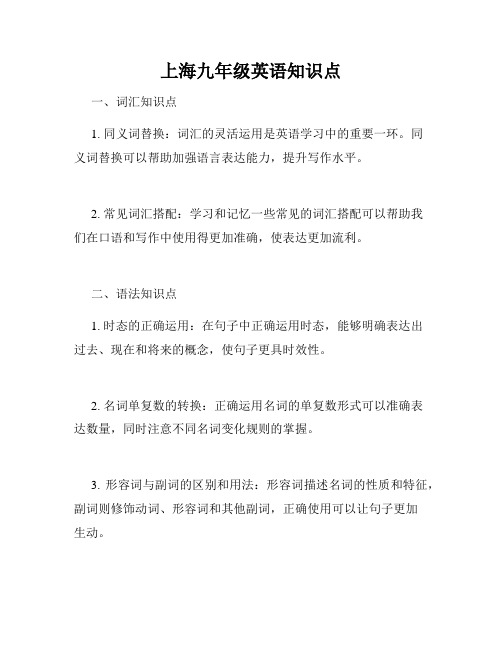
上海九年级英语知识点一、词汇知识点1. 同义词替换:词汇的灵活运用是英语学习中的重要一环。
同义词替换可以帮助加强语言表达能力,提升写作水平。
2. 常见词汇搭配:学习和记忆一些常见的词汇搭配可以帮助我们在口语和写作中使用得更加准确,使表达更加流利。
二、语法知识点1. 时态的正确运用:在句子中正确运用时态,能够明确表达出过去、现在和将来的概念,使句子更具时效性。
2. 名词单复数的转换:正确运用名词的单复数形式可以准确表达数量,同时注意不同名词变化规则的掌握。
3. 形容词与副词的区别和用法:形容词描述名词的性质和特征,副词则修饰动词、形容词和其他副词,正确使用可以让句子更加生动。
4. 介词的正确使用:正确使用介词可以帮助准确表达位置、方向、时间、原因等概念,增强句子的表述能力。
三、阅读理解技巧1. 主旨大意的把握:通过阅读理解题,我们需要准确把握文章的主旨大意,从而迅速定位答案,提高解题效率。
2. 猜词猜句:阅读中经常会遇到一些生词和生句,这时我们可以通过上下文来推测词义和句意,提高阅读理解能力。
3. 推理判断:阅读理解题中的推理判断类题目需要我们通过对文章逻辑的理解和推理,进行正确的判断。
四、写作技巧1. 开头结尾的写作技巧:一个好的开头和结尾能够吸引读者的注意力,给人留下深刻的印象。
2. 运用连接词:使用适当的连接词,可以使文章的段落结构更加紧密,句与句之间更加流畅。
3. 使用丰富的句型:使用不同的句型可以使文章更具变化性,提高写作技巧。
五、听力技巧1. 注意关键词:在听力材料中,关键词是我们捕捉信息和理解内容的关键,需要我们重点抓取。
2. 注意听力顺序词:顺序词如首先、然后、最后等在听力中起到先后顺序和时间顺序的作用,需要我们注意理解。
3. 提醒词的作用:一些提醒词如but、however等可以帮助我们理解上下文中的转折关系。
六、口语表达技巧1. 夸张法:适当运用夸张手法可以增加语言的表现力,让口语更加生动有趣。
上海中考英语各语法点基础考点归纳

冠词一、固定词组1. 有些固定词组中有the : in the middle of, go to the cinema/ movies, play the violin/ piano/ guitar, in the end, the same2. 有些词组中不用任何冠词:by bus, play football, play chess, go to school, go to bed, at first, lose weight3. 有些词组中加a: catch a bus, in a hurry, take a walk,二、专有名词前1.国家、城市等专有名词前不加the : Shanghai, in New York, in America,但是the United Sates 要加the2. 由普通名词构成的专有名词前加the Great Wall,3. 江河、海洋、山川前加the: the Yangtze River, the Pacific, the Yellow Mountains 三.一日三餐、四季、一星期七天及十二个月,next前不加任何冠词1. for breakfast/lunch/supper2. in spring/ summer /autumn /winter3.on Monday /Tuesday /Wednesday /Thursday /Friday /Saturday / Sunday4.inJanuary,February,March,April,May,June,July,August,September,October,November,De cember四、宇宙中独一无二的事物,序数词,形容词最高级,only所修饰的名词前用the1. the sun, the moon, the earth2. the eighth, the twelfth, the twentieth, the fourth3. the biggest, the most popular4. the only key五、形容词加the, 表示这一类人the blind, the deaf, the old, the rich, the poor六、单词前面用“an”还是“a”取决于单词开头的读音是否是原音1. a: a useful dictionary, a university student, a European village, a one-eyed captain, a uniform2. an: an hour, an honest girl, an e-mail, an important letter, an exchange student, an unclean X-ray photograph, an MBA course,There is __an __”f” in the word “first”. ( f, h, l, m, n, s, x, r, )介词分类记忆:一、时间介词具体哪一天on, 几点钟前用at, 年、月份前用in, 早上、下午、晚上用in, 但是具体某一天的早上、下午、晚上用on。
上海市初中中考英语语法大全

英语语法大全学习提纲时态一、词类、句子成分和构词法:1、词类:英语词类分十种:名词、形容词、代词、数词、冠词、动词、副词、介词、连词、感叹词。
1、名词(n.):表示人、事物、地点或抽象概念的名称。
如:boy, morning, bag, ball, class, orange.2、代词(pron.):主要用来代替名词。
如:who, she, you, it .3、形容词(adj..):表示人或事物的性质或特征。
如:good, right, white, orange .4、数词(num.):表示数目或事物的顺序。
如:one, two, three, first, second, third, fourth.5、动词(v.):表示动作或状态。
如:am, is,are,have,see .6、副词(adv.):修饰动词、形容词或其他副词,说明时间、地点、程度等。
如:now,very, here, often, quietly, slowly.7、冠词(art..):用在名词前,帮助说明名词。
如:a, an, the.8、介词(prep.):表示它后面的名词或代词与其他句子成分的关系。
如in, on, from, above, behind.9、连词(conj.):用来连接词、短语或句子。
如and, but, before .10、感叹词(interj..)表示喜、怒、哀、乐等感情。
如:oh, well, hi, hello.2、句子成分:英语句子成分分为七种:主语、谓语、宾语、定语、状语、表语、宾语补足语。
1、主语是句子所要说的人或事物,回答是“谁”或者“什么”。
通常用名词或代词担任。
如:I’m Miss Green.(我是格林小姐)2、谓语动词说明主语的动作或状态,回答“做(什么)”。
主要由动词担任。
如:Jackcleans the room every day. (杰克每天打扫房间)3、表语在系动词之后,说明主语的身份或特征,回答是“什么”或者“怎么样”。
上海中考英语复习八大时态

上海中考英语复习八大时态集团标准化工作小组 #Q8QGGQT-GX8G08Q8-GNQGJ8-MHHGN#上海中考英语复习-八大动词时态一、一般现在时1、结构肯定式:主语+ am /is/are +其他否定式:主语+ am/is/are +not + 其他一般疑问句式:Am /Is /Are + 主语+ 其他简略回答: (肯) Yes,主语 + am/ is /are (否)No,主语+am/is/are not肯定句式: 主语+动词原形/动词的第三人称单数+其他否定句式: 主语+(助动词) don't/doesn't +动词原形+其他一般疑问句式: Do/Does+主语+动词原形+其他简略回答: (肯)Yes,主语+do/does (否)No,主语+do/does not缩写形式: don't = do not doesn't = does not2、用法1)表示经常的或习惯性的动作,常与表示频度的副词连用。
常用的频度副词有:always、often、 usually、seldom、never、sometimes, every week (day, year, month…), once a week, on Sundays。
频度副词在句中通常放在行为动词之前,系动词、助动词之后。
例如: He often goes swimming in summer.他夏天经常游泳。
I usually leave home for school at 7 every morning. 每天早上我七点离开家。
2)表示现在的状态。
例如:My father is at is very busy. 我父亲在工作,他很忙。
The boy is twelve. 这男孩十二岁。
3)表示主语具备的性格、特征和能力等。
例如:All my family love football .我全家人都喜欢足球。
上海中考英语知识点

上海中考英语知识点一、语法1.时态:一般现在时、一般过去时、一般将来时等常见时态的用法。
2.语态:主动语态和被动语态的转换及用法。
3.句型转换:一般疑问句、否定句、祈使句、条件句等句型的转换。
4.并列和从属关系:并列连词及从属连词的使用。
5.名词性从句:宾语从句、主语从句、表语从句和同位语从句的结构和功能。
6.定语从句:关系词的用法及引导定语从句的关系词的选择。
7.状语从句:时间状语、条件状语、原因状语、目的状语、结果状语和方式状语从句的用法。
二、词汇1.同义词和近义词:根据上下文的意思选择同义词或近义词进行填空或选择题。
2.动词短语:常用的动词短语及其用法。
3.词性转换:名词、动词、形容词和副词的转换及用法。
4.习惯用语:一些常用的固定搭配和习惯用语的使用。
5.词汇辨析:根据词义辨析选择合适的词语填空。
三、阅读理解1.细节理解:根据短文内容回答问题,要求准确理解文意。
2.推理判断:根据短文中的线索进行推理判断。
3.阅读技巧:通过预测题目、查找关键词、注意修饰词等技巧快速定位答案。
4.文章结构:了解文章的结构和段落之间的逻辑关系。
5.标题概括:根据短文内容选择合适的标题或进行概括。
四、写作1.书面表达:根据所给的提示和要求写出完整的句子或段落。
2.短文改错:对短文进行修改,包括语法、拼写、标点等方面的错误。
3.作文结构:组织语言,合理安排文章的开头、中间和结尾。
4.内容连贯:使用逻辑连接词和过渡词使文章内容有条理。
这些知识点是上海中考英语考试的重点,通过复习和练习可以提高应试能力。
不同的学校和教材可能会有些许差异,建议学生根据自己的情况进行有针对性的复习。
同时需要注意平时的积累和理解,要边读边记,并在课后进行巩固练习。
上海中考英语必考语法点梳理
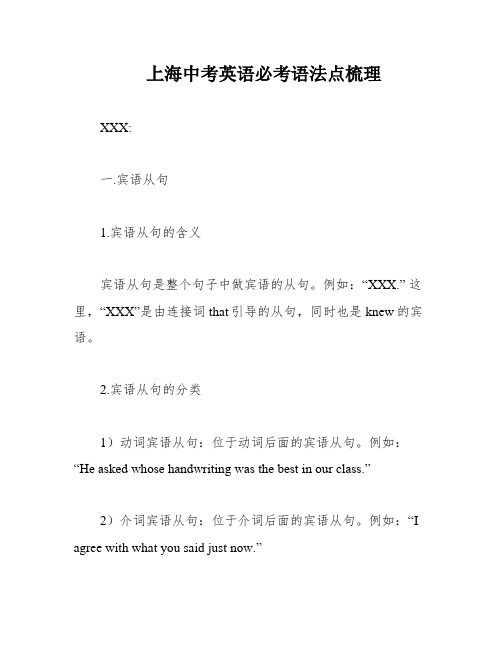
上海中考英语必考语法点梳理XXX:一.宾语从句1.宾语从句的含义宾语从句是整个句子中做宾语的从句。
例如:“XXX.” 这里,“XXX”是由连接词that引导的从句,同时也是knew的宾语。
2.宾语从句的分类1)动词宾语从句:位于动词后面的宾语从句。
例如:“He asked whose handwriting was the best in our class.”2)介词宾语从句:位于介词后面的宾语从句。
例如:“I agree with what you said just now.”3)形容词宾语从句:位于形容词后面的宾语从句。
例如:“I am afraid that I will be late.”3.引导名词性从句的连接词1)that:在宾语从句中不做成分,没有实际含义。
2)whether/if:表示是否,在宾语从句中不做成分。
例如:“I don't know if/whether he still lives here after so many years.”3)连接代词:what。
which。
who。
whom。
whose(在宾语从句中做主、宾、表和定语);连接副词:where。
when。
how。
why(在宾语从句中做状语)。
例如:“The small children don't know what is in their stockings.”4.在做宾语从句的题目时应注意两点1)时态:当主句是现在时态时,宾语从句可以根据需要使用任何时态。
例如:“I don't know when he will come back.”他告诉我他的姐姐昨天回来了。
当主句是过去时态时,宾语从句必须使用一种过去的时态。
她问我是否知道这是谁的钢笔。
他说他能在晚饭前完成他的工作。
任何时候表示客观事实或普遍真理的句子做宾语从句时,都使用一般现在时。
老师说地球绕着太阳转。
定语从句是修饰某一名词或代词的从句。
九年级英语知识点上海
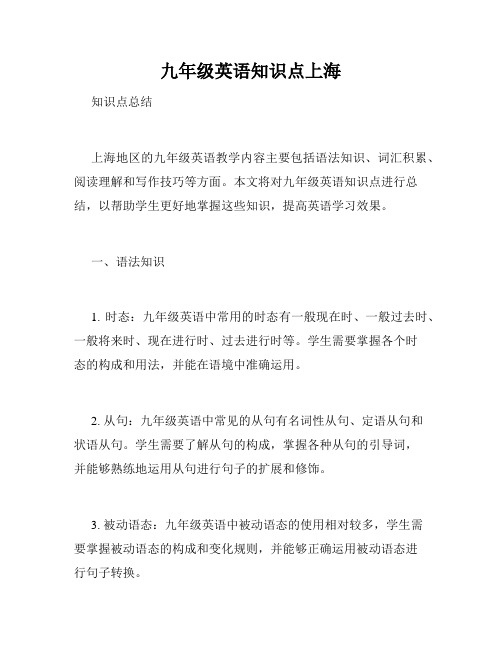
九年级英语知识点上海知识点总结上海地区的九年级英语教学内容主要包括语法知识、词汇积累、阅读理解和写作技巧等方面。
本文将对九年级英语知识点进行总结,以帮助学生更好地掌握这些知识,提高英语学习效果。
一、语法知识1. 时态:九年级英语中常用的时态有一般现在时、一般过去时、一般将来时、现在进行时、过去进行时等。
学生需要掌握各个时态的构成和用法,并能在语境中准确运用。
2. 从句:九年级英语中常见的从句有名词性从句、定语从句和状语从句。
学生需要了解从句的构成,掌握各种从句的引导词,并能够熟练地运用从句进行句子的扩展和修饰。
3. 被动语态:九年级英语中被动语态的使用相对较多,学生需要掌握被动语态的构成和变化规则,并能够正确运用被动语态进行句子转换。
4. 情态动词:九年级英语中的情态动词包括can、could、may、might、must、shall、should、will、would等。
学生需要理解情态动词的含义,并能够准确运用情态动词表达各种语气和情态。
二、词汇积累1. 高频词汇:九年级英语中有许多高频词汇需要学生熟练掌握,比如常见的名词、形容词、动词以及一些常用短语和固定搭配。
学生可以通过刷题、做题和背诵等方式积累词汇量。
2. 同义词和反义词:掌握同义词和反义词的用法,可以帮助学生在写作和阅读理解中更加准确地表达自己的意思。
3. 词形变化:学生需要了解词的各种变化形式,比如名词的复数形式、形容词的比较级和最高级、动词的过去式和过去分词等。
掌握这些变化规则可以帮助学生更好地理解和运用词汇。
三、阅读理解九年级英语中的阅读理解主要包括短文阅读和理解问题、根据短文内容填写表格或完成句子、根据短文选择正确答案等。
学生需要提高自己的阅读理解能力,培养快速获取信息和总结归纳的能力。
四、写作技巧九年级英语中的写作任务主要包括书面表达、写作短文等。
学生需要了解写作的基本要求和结构,熟悉各种写作题材,并能够准确地运用所学的语法知识和词汇进行表达。
上海中考英语考纲单词、词组默写

上海中考英语考纲单词、词组默写初三英语考纲词汇默写中文+词性能够;有能力的adj.能力;才能n.关于prep.大约;到处;四处adv.在……上面prep.在国外adv.接受;认可v.令人惊讶的adj.精确地adv.加;增加n.地址n.英文中文+词性得到;实现v.穿过;横过prep.扮演v.行动n.积极的;主动的adj.活动n.男演员n.女演员n.加上v.活着的adj.英文车祸,事故;意外的事n.adj.1、(修饰单数名词)全;总;整2、(修饰复数名词)全部;所有的全部adv.全部;全体人员pron.所有;全体职员n.允许,答应v.简直,差不多adv.单独地adv.沿着;顺着prep.采用,采纳;收养v. 广告n.劝说;警告n.担负得起……的费用;抽得出(工夫)prep.畏惧;忧郁adj.非洲n.有利条件;优势;优点n. 在……之后,在……后面prep.在后;厥后adv. 在……以后conj.下战书n.再一次;再;又adv.反对prep.时代;年龄n.有……之年岁的adj.代理人n.早年adv.同意;应允v.在前adv.目的n.瞄准v.氛围;大气n.空调n航线n.机场n.警报n.向前;和……一起;一同adv. 已经adv.也adv.虽然;尽管conj.总共;全部地adv.总是;永远adv.上午令人惊讶的adj.雄心;野心n.美国,美洲n.美国的;美洲的adj.美国人n.在(三者或三者以上)之间;系……中之一;与……在一同prep.数量;总数n.引起乐趣的,娱人的adj.1初三英语考纲词汇默写中文+词性现代的adj.和conj.生气地;愤怒的adv.生气的;愤怒的adj.动物n.再一;另外一;此外adj.另外一个pron.回答;答复;答案;回(信)n.回答;答复;回(信)v. (用于疑问句,否定句,条件句)一些;什么;任何的;任一的adj.(无论)哪一个;(无论)哪些pron.任何人pron.英文中文+词性到达;达到v.艺术n.文章n.艺术家;画家n.英文当……时;像……(一样);如同;因为;由于conj.一样地adv.当……时;作为;当作prep.亚洲n.问;请求;要求v.助手,助理n.在……(表示地点、时间、工具、偏向等)大西洋n.进攻;攻击v.出席,参加v.吸收v.有吸引力的adj.八月n.姑;姨;婶母;舅母n.澳大利亚n.澳大利亚的adj.澳大利亚人n.著者;作家n.自动的adj.秋天;秋季n.可用的;可得到的adj.平均;平均数n.甚么事(物);任何事(物)pron.任何中央adv.道歉v.出现v.苹果n.四月n.面积;地区n.争论;争吵v.手臂n.军队;陆军n.吸引;吸引力;吸引物n. 在……周围;环绕XXX.安排;布置v.2初三英语考纲辞汇默写中文+词性平均的adj.授予v.奖,奖品n.离开,远离adv.可怕的adj.婴儿n.向后;回原处adv.背;背后;后部n.糟糕;可惜;坏的;严重的adj.书包;提包;袋子n.均衡n.球n.气球n.香蕉n.银行n.酒吧n.基地;基础n.篮子n.篮球n.球拍n.洗澡n.战争;战役n.是;成为v.海滩n.英文熊n.美丽的adj.精美地adv.因为conj.变得;成为v.床n.卧室n.啤酒n.中文+词性英文在……前面;在……以前prep.早年adv.在……之前conj.请求v.入手下手;着手v.开始;开端n.在……后面prep.在后面;向后adv.人;生物n.相信;认为v.钟;铃n.属;隶属v.在……下面prep.带子n.在……旁;靠边prep.除了prep.(good和well的最高级形式)最好的adj.(well的最高级形式)最好地dv.敲打;打败;(心)跳动v. 3初三英语考纲词汇默写中文+词性最好的(人或物)n. (good和well的比较级方式)较好的adj.在(二者)之间prep.自行车n.大的adj.超片,纸币;账单n.书;本子n.预订(票,坐位)等v.令人厌烦的v.英文煮v.骨头n.中文+词性英文(动词bear的过去分词)出生箱子,垃圾箱n.鸟n.(向他人)借;借用v.两者(都);两人(都);双方pron.华诞n.两……(都);两个……(都)adj.饼干n.一点;一些n.咬v.黑色n.黑色的adj.黑板n.毯子n.瞎的adj.盲人n.一排房屋;街区(四条街道的区域);大块n. 吹;刮风;吹气v.蓝色n.蓝色的adj.板;木板n.两个都adv.瓶n.底部n.碗n.箱;盒n.男孩n.勇敢的adj.面包n.打破;打断v.休息n.早饭n.呼吸n.桥n.简短的,简洁adj.豁亮的;聪明的adj.豁亮地adv.带来,拿来v.登,上(飞机,船等)v.划船(游玩)v.身体;躯体n.4初三英语考纲辞汇默写中文+词性不列颠(即英国)n.英国人n.英国的adj.广播;节目n.兄弟n.英文中文+词性再见int.卷心菜n.蛋糕;饼;糕n.计算器n.英文称呼;取名;呼唤;打电话给…v.棕色;褐色n.棕色的;褐色的adj.刷子n.刷;擦v.建造;建筑v.建筑物;大楼n.外滩n.燃烧v.公共汽车n.商业;生意n.商人n.女商人n.忙adj.但是conj.黄油n.蝴蝶n.按钮;纽扣n.采办v.靠近;在……旁边;(指时间)不迟于;(用于被动语态)被prep.叫;喊;(一次)电话,通话n. 照相机n.野营n.能,会;可能v. aux.加拿大n.加拿大的adj.加拿大人n.取消v.烛炬n.帽子n.首都n.船长n.小汽车n.卡片n.小心;关心;照管XXX. 小心的;仔细的adj.小心地;仔细地adv.胡萝卜n.运送;搬运;照顾v.5初三英语考纲辞汇默写中文+词性动画片;漫画n.箱,盒;案件n.猫n.患(病);弄清楚;体会;理解v.原因n.使产生,引起v.庆祝v.分(美国泉币单位)n. 中心;中央n.世纪,百年n.一定的,有掌控的adj. 好adv.椅子n.机遇n.改动;变动;兑零钱v. 易变的,可变的adj. (电视)频道n.角色n.主管,掌管n.慈悲n.廉价的,廉价的adj.检查XXX.欢呼;喝彩XXX.奶酪n.化学的adj.英文中文+词性化学物资n.化学n.国际象棋n.胸n.小鸡;鸡肉n. 首领,头目n. adj.孩子;儿童n. 中国n.中国人;汉语n. 中国的adj.巧克力n.挑选n.挑选v.圣诞节n.教堂n.香烟n.电影院;电影n. 圆,圈n.市民n.城市n.拍手v.& n.英文接住;捉住;赶上(车辆);首要的,首要的;首席的一定;无疑;是的,固然;特征,特性;性格;人物,班级;(一节)课;等级n.同砚n.教室n.干净的;清洁的adj.打扫;弄洁净;擦洁净v.模糊的;豁亮的;清楚的adj.清楚;打扫(天气)转晴v.模糊地;豁亮地;清楚地adv.6初三英语考纲词汇默写中文+词性职员;办事员n.聪明的adj.气候n.爬v.医务室n.时钟n.关;闭v.近的adj.近;靠近adv.衣服n.云n.多云的;阴天的adj. 海岸n.外衣;上衣n.咖啡n.硬币n.冷的;寒冷的n.寒冷;着凉;感冒n. 收集;采集v.收集n.学院n.颜色n.涂色v.来;来到v.惬意的adj.普通的adj.交流,交际v.公司n.比力v.比赛n.7英文中文+词性抱怨;投诉v.完全的,完全的adj.完成,结束v.计算机n.音乐会n.结论;竣事,结局n.英文(汽车、电车上的)售票员;(火车上的)列车员n. 集会;讨论会n.确信的;有信心的,自信的adj.使混淆v.祝贺n.连接;把……连接起来构成;构成v.竞赛n.洲;大陆n.连续v.控制v.& n.便利的;方便的adj.会话;说话n.厨师;炊事员n.烹调;煮;烧v.凉的;风凉的;酷adj.冷却v.抄本;副本;一本(份,册)n.抄写;复制;模仿v. 角;拐角n.正确的adj.初三英语考纲辞汇默写中文+词性矫正;纠正v.值(几何钱);破费v. 棉花n.咳嗽v.& n.数v.国家;农村;乡下n.英文中文+词性破损v.舞蹈v.& n.危险n.危险的adj.黑暗;黑色;深色n.英文黑暗的;黑色的;深色的adj.(一)对,(一)双,(一)副n.过程;课程n.日期n.女儿n.(一)天;(一)日;白天n.死的;无生命的adj.堂(表)兄,弟;堂(表)姐,妹n.掩盖;隐瞒;袒护v.分派,分给;赐与;经营;对付v.掩盖物;封面n.母牛n.亲爱的adj.呵,哎呀(表示伤心,交际,惊奇等)int.发狂的,疯狂的adj.创造;创作v.十字,叉n.穿越v.拥挤的;满座的adj. 喊叫;哭v.& n.文明n.杯子;杯n.气;风俗n.顾客n.死亡n.争论,辩论,讨论n. 十二月n.决定;下决计v.决定n.装饰v.深adj.学位,度n.耽搁,延误XXX.美味的,适口的adj. 送达,传送v.牙科医生n.百货商店n.启程;离开;出发n. 依靠,依赖v.切;割;剪;砍;削v. 骑车v.日报n.8初三英语考纲辞汇默写中文+词性描述v.沙漠n.值得v.设计v.书桌;写字台n.破坏n.侦探的adj.侦探n.英文中文+词性不喜欢v.英文陈列,展览;显示XXX. 间隔n.分,划分;除v.干;做(事)v.放在主语前构成疑问;与not连用构成否定句v. aux.医生n.狗n.(美国、加拿大等国的货币单位)元n.门;通道n.向下adv.prep.往楼下;在楼下adv. 画,绘制;拉,拖v.梦想;梦n.服装,女装,童装n.穿衣v.喝;饮v.饮料;喝酒n.驾驶;驱赶v.驾驶员,司机n.滴n.扔;掉v.干的;干燥的adj.鸭n.乏味的adj.发展;开发,培养v. 发展n.对话n.日志n.辞典;辞书n.死v.食品;食谱n.区别n.adj.困难的;困难的adj.困难n.v.餐厅n.正餐n.脏的adj.消逝v.发现,看出v.讨论v.讨论n.盘;碟;(盘装)菜肴不诚实adj.沿着(街道、河流)而下不同的;差异的挖(洞,沟等);掘9初三英语考纲词汇默写中文+词性馄饨;汤团n.在……的时代prep.责任n.英文电n.电子的adj.低级的;根本的adj.大象n.其他的;此外adj.空的adj.勉励;怂恿v.初步;起点;末了n. 结束v.仇敌n.活力;能量n.引擎,发起机n.工程师n.英格兰n.英国;英国人;英语n. 英国的;英语的adj.观赏;享有;喜欢v.中文+词性英文每人;每个;每件adj. 每人;每个;每件pron. 渴望的adj.耳朵n.早的adj.地球n.容易地adv.东,XXX.东方的adj.吃v.经济;节约n.教育n.教育的adj.效果n.效率高的;有能力的adj.蛋;卵n.容易的;不费力的adj. 令人舒畅的,令人欢喜的adj.足够的充分的adj.足够地;充分地adv. 充足;充分n.进入;参加v.入口n.信封n.环境n.(两者中)任何一方(的);两者之一的adj. (两者中)任何一方(的);两者之一的adj. (两者中的)任何一方;两者之一pron. (用于否定句或否定短语)也(不)adv.等于v.逃跑;逃亡v.特别地adv.住宅区n.年龄较大的;年长的adj.电的adj.10初三英语考纲词汇默写中文+词性欧洲n.(节日的)前夜,前夕n.甚至;连(……都);更adv.薄暮;早晨n.比赛项目;变乱n.每一;每个的adj.每人;人人pron.每日的;一样平常的adj. 每件事;事事pron.到处adv.确切地,精确地;(表示赞同的回答)确实如此adv.测验;测试;检查n. 检查;细查;对……进行考试v.例子;榜样n.极好的adj.除……之外prep.交换;交流v.镇静的adj.使人兴奋的adj.原谅;宽恕v.接口;辩解n.锻炼;做操;练,题n.展览;博览会n.期待v.破费;费用n.11英文中文+词性昂贵的adj.经验;经历n.实验n.解释;说明v.探究,探索;勘察v. 伸,伸出v.眼睛n.寓言n.脸,面孔n.事实;实际n.工厂n.失利;不及格v.英文曾经;在任何时候adv. 公平的;合理的adj.落下;下降;倒下;跌倒v.熟悉的adj.家庭n.有名的adj.扇子n.远的adj.远地adv.农场;农庄n.农民,农民n.快的,迅速的adj.快地;迅速地adv.肥胖的adj.脂肪n.初三英语考纲词汇默写中文+词性父亲n.恩惠n.最喜爱的adj.传真n.恐惧n.二月n.豢养;豢养v.感觉;摸;触v.女性;雌性n.围墙;栅栏n.渡船n.节日n.取v.发烧n.不多;少数pron.不多的;少数的adj.英文中文+词性火;火炉;火灾n.消防队员n.炊火n.第一的;最初的adj.第一;首先;最初adv. 入手下手;初步n. 鱼;鱼肉n.捕鱼;钓鱼v.渔夫,捕鱼人n.适合;与……相配v. 健康的adj.安装;修理v.旗n.闪光;闪现;手电筒n.一套房间;公寓n.飞翔n.洪水;水灾n.花n.飞;飞翔;乘飞机游览v. 雾n.听从v.下列的adj.喜爱的adj.食品;食品n.傻子n.愚弄;欺骗v.愚蠢的;傻的adj.英文田地;牧场;场地;原野;战地n.打仗v.外形;数字n.装满;注满;充溢v.电影;影片;胶卷n.末了的;终究的adj.最终;最后adv.找到;发现;发觉v.(身体)好;美好的;晴朗的adj.手指n.竣事;做完v.地面;地板;(楼房的)层n.12初三英语考纲词汇默写中文+词性轻柔地adv.地理n.德国人;德语n.德国的adj.德国n.成为;变得;得到;到(用于have got短语中)有v. 女孩n.给;递给;支付v.镇静的;甘愿应允的adj. 玻璃;玻璃杯;(pl.)眼镜n.全球的;球形的adj.手套n.v.目标n.n.金;黄金n.金色的adj.好,良好adj.再见;再会int.政府n.半;一半adj.大厅;礼堂n.手n.递;给;交付v.悬挂v.发生;碰巧v.幸福地;快乐地adv.幸福的;XXX的adj.口岸;港湾n.adj.努力地;(雨、雪等)猛烈地adv.气n.头发n.一半n.猜测;推测v.客人;宾客n.指点;导游;指南n. 炮;枪n.英文中文+词性巨大的;重要的(白话)美妙的;好极的adj.绿色;青色n.绿色的;青色的adj.空中;土地;举动n.群;小组n.生长;发育;种植v.英文去;走;驶;通道;达到等级:(黉舍的)年级n. 大学毕业生n.大学卒业;卒业v. (外)祖父n.(外)祖母n.草;草场;牧草n.硬的;困难的;艰难的13初三英语考纲词汇默写中文+词性巨大的;庞大的adj.人们的;人类的adj.人n.诙谐;诙谐感n.饥饿地adv.饥饿的adj.打猎v.赶紧;急忙v.& n.痛;使受伤痛v.丈夫n.小屋;棚屋n.冰n.冰淇淋n.n.1.(毗连状语从句)假如;假使2.(毗连宾语从句)是不是;是不是conj.有病的;不健康的adj.病;疾病n.立即adv.重要性n.重要的adj.不可能的adj.改善;改进v.在……中2.在……(工夫)、3.……(情况、状态)中4.以……(方法);使用……(言语)5.穿;戴prep.14英文中文+词性在家;在内;向内adv. 英寸n.包括;包含v.增加;增加;促进v.的确;真正的adv.独立的;有主见的adj. 印度人;印第安人;印第XXX.印度的;印第安人的adj. 个人的,个体的adj.室内的adj.信息;情报;资料n.墨水n.prep.……之内;在里面;在内部adv.英文主意;意见;打算;想法在……里面;在……之内代替;顶替adv.兴趣;趣味n.感乐趣的adj.有趣的;有意思的adj.国际的adj.英特网(国际互联网)n.面谈,访谈,采访v.& n.1.(动作方向)到……内;向内2.(表示情况和结果的变化)酿成prep.1.(位置)在内;在里面;初三英语考纲词汇默写中文+词性介绍v.创造,创造v.英文中文+词性法官,评判员n.审判,评定v.果汁n.七月n.跳;跳跃v.跳;跳跃n.六月n.低级的adj.英文发明,创造;发明物n. 发明者,发明家n.邀请n.邀请v.铁n.岛屿n.意大利人;意大利语n. 意大利的;意大利语的adj.意大利n.节目;项目n.短上衣,夹克衫n.果酱;拥堵n.一月n.日本n.日本人;日语n.日本的adj.牛仔裤n.工作;零活n.参加;加入v.玩笑n.开玩笑v.旅行n.欢乐;高兴n.恰好;恰好;刚才;仅;不外adv.热心的adj.保持;保存;保持(某种状态)连续不竭v.钥匙;答案n.键盘n.踢v.开玩笑v.小孩n.杀死,弄死v.公斤,千克n.公里,千米n.友好的;和蔼的adj. 种;类n.幼儿园n.仁慈;好意n.XXX;国王n.厨房n.风筝n.15初三英语考纲词汇默写中文+词性小刀n.敲;击;敲门v.敲门(声)n.了解;知道;认识v. 知识n.实验室n.女士n.湖n.灯n.陆地;土地n.降落;登陆v.语言n.灯n.大的;巨大的adj.英文中文+词性离开;把……留下;剩下v.。
(完整)上海初三英语中考知识点整理,推荐文档

欢迎阅读近五年中考题考点整理Part II 基础第一部分选择题一 .人称代词32.33.32.34.A) another B) the other C) other D) the others36.“Have ________ try, you are so close to the answer,” the teacher said to Eric.A) the other B) one another C) other D) another三.形容词、副词36.Is this a photo of your daughter? She looks ____________in the pink dress!A) lovely B) quietly C) politely D) happily37.Everyone likes Kevin because he talks to others ________.A) friendly B) lovely C) politely D) luckilynding on the moon sounds ________. I hope I can go there one day.A) wonderful B) wonderfullyC) terrible D) terribly35.39.37.38.39.40.37. Martin and his friends didn't eat up all the food they ordered, __ they took the rest away.A) for B) or C) so D) as38. Peter will cook for his parents __ the International Day' of Families comes.A) unless B) when C) until D) though 42.Which do you prefer to use to keep in touch with your friends,QQ__________MSN?A)and B)but C)or D)so43.I hate travelling by air_________you usually have to wait for hours before the plane takes off.39.now.40.A) go B)went C) will go D)have gone41.The Harry Potter books____________pretty popular since they were published.A) become B) will become C) have become D) are becoming42. A Disneyland Park in Shanghai Pudong New Area in the near future.A) builds B) has built C) will build D) will be built42.Soon you ________ a senior high school student. Isn’t it exciting!A) become B) will becomeC) became D) have become43.I ________ a copy of Yi Zhongtian’s book yet. I might buy one tomorrow.A) hadn’t bought B) don’t buy C) won’t buy D) haven’t boughtthe Art Festival when I passed by their school.44..45.15. By the end of last week, she in the west of China for two months helping the homeless children.A) will stay B) has stayed C) would stay D) had stayed12.Aunt Lucy will tell us something about her trip to Australia when she______ack.A) cameB) comes C) would come D) will come48. I'm sure that stri cter roles to control ci garette smoking very soon.A) made B) will make C) were made D) will be made46. After Donghai Bridge ________, it became a new tourist attraction.A) completed B) complete C) is completed D) was completed六.固定搭配45.41.42.47..48..3.Students are encouraged to share their learning experience__________ their classmates.A) to B) in C) at D) with16.Harry has decided __________ an online shop after graduating from school.A) open B) to open C) opened D) opening17.I wouldn’t mind_____a roommate. We can help each other and save money as well.A) having B) to have C) have D) had43.Richard turned off the computer after he had finished _________ the email.A) write B) to write C) writing D) wrote44. Before going to the History Museum, our teacher told us _________ the public rules.Park.39.40.9.44.A) can’t B) shouldn’t C) needn’t D) mustn’t八.感叹句47. _________exciting sport it is to climb the mountains!A) How B)What C) What a D) What an47. ______ wonderful concert they are putting on in the city square!A) How B) What C) What a D) What an13. The robot can help me sweep the floor. ________ smart invention it is!A) What B) What a C) What an D) How九.疑问词46.38.5.43.48.I want to know______________.A) when we should arrive at the airport B) when should we arrive at the airportC) when the airport we should arrive at D) when the airport should we arrive at46.The official said they__________ a new law to protect the tourists the next year.A)makes B)would make C)made D)have made十一名词33.51.34.36.35..十二。
上海中考英语知识点(一)

上海中考英语知识点(一)上海中考英语知识点详解一、听力理解•短对话理解:需要听懂对话中的关键信息,如人物身份、时间、地点、事情等等。
•长对话理解:需要听懂对话中的大意和细节,并能回答相应的问题。
•短文理解:需要听懂短文中的大意和细节,并能回答相应的问题。
二、语法知识•时态:包括一般现在时、一般过去时、一般将来时、现在进行时等。
•被动语态:需要掌握被动语态的构成和用法。
•倒装语序:需要掌握倒装句的基本结构和具体应用。
•虚拟语气:需要掌握虚拟语气的用法,如虚拟条件句、虚拟语气的时态等。
三、阅读理解•短文阅读理解:需要理解短文的主旨、大意和细节,并能回答相应的问题。
•图表阅读理解:需要理解图表中的数据和信息,并能回答相应的问题。
•语篇阅读理解:需要理解文章的结构和逻辑,把握文章的主旨和作者意图。
四、写作技巧•书面表达:需要掌握书面表达的基本结构和写作技巧,如开头、结尾的写法,段落的组织和连接等等。
•作文素材积累:需要积累各类作文的素材,如环保、科技、教育等,以便在考试时能够灵活运用。
五、词汇运用•词义辨析:需要区分词义相近但用法不同的词汇,如“beautiful”和“pretty”。
•词组搭配:需要掌握常用的词组搭配,如“take a shower”和“have a shower”。
•固定搭配:需要掌握一些常用的固定搭配,如“look forward to”和“get along with”。
以上是关于上海中考英语的相关知识点的详解,希望能对考生有所帮助。
加油!当然,下面继续为你介绍更多关于上海中考英语的知识点。
六、词法运用•词形转换:需要熟练掌握单词的词性转换,如名词变形为形容词、动词变形为名词等。
•词根词缀:需要了解常用的词根和词缀,以便理解和记忆生词的含义。
•同义词反义词:需要掌握一些常用的近义词和反义词,以便更准确地表达自己的意思。
七、阅读技巧•查找信息:需要能够快速找到所需的信息,如通过关键词、标题等找到相应的内容。
上海初中英语知识点总结归纳

上海初中英语知识点总结归纳一、词汇与语法1. 词汇积累- 基础词汇:掌握日常生活、学习、文化、社会等方面的基础词汇,能够进行简单的日常交流。
- 主题词汇:针对不同的主题,如家庭、学校、职业、节日等,积累相关词汇。
- 词性变化:了解名词、动词、形容词、副词等词性的构成和变化规则,如复数形式、过去式、比较级等。
2. 语法结构- 时态:掌握一般现在时、一般过去时、一般将来时等基本时态的构成和用法。
- 语态:了解主动语态和被动语态的区别及转换方法。
- 句型:熟悉肯定句、否定句、疑问句、祈使句等基本句型。
- 从句:学习简单句和并列句,了解名词性从句、定语从句和状语从句的基本结构。
- 非谓语动词:掌握动名词、分词(现在分词和过去分词)的用法。
- 情态动词:了解can, could, may, might, must, should等情态动词的用法。
二、阅读理解1. 阅读技巧- 快速阅读:培养快速浏览文章,抓住主旨大意的能力。
- 精读:通过细致阅读,理解文章的具体内容和深层含义。
- 推理判断:根据上下文线索,推断生词含义和隐含信息。
2. 阅读题型- 事实细节题:定位文章中的具体信息,回答关于事实的问题。
- 主旨大意题:把握文章的中心思想或标题。
- 推理判断题:根据文章内容进行逻辑推理,得出结论。
- 词义猜测题:根据上下文猜测生词或短语的意思。
三、写作技巧1. 写作结构- 引言:开篇引入话题,提出观点或问题。
- 正文:分段阐述观点,提供支持细节或例证。
- 结尾:总结全文,重申观点或提出建议。
2. 写作类型- 描述性写作:描述人物、地点、事件等。
- 叙事性写作:讲述故事或经历。
- 说明性写作:解释概念、过程或现象。
- 议论性写作:提出观点,进行论证。
3. 写作技巧- 词汇运用:使用恰当的词汇和短语表达思想。
- 句式多样性:运用不同句型和结构,增加文章的丰富性。
- 逻辑连贯:使用连接词和过渡句保持文章的流畅和连贯。
上海市中考英语考纲词汇
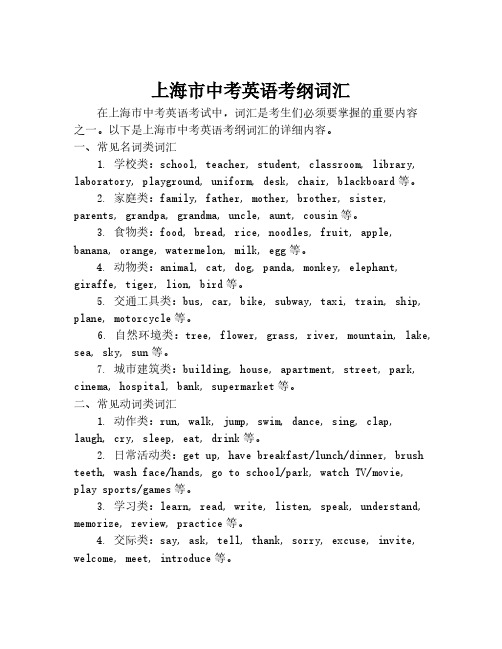
上海市中考英语考纲词汇在上海市中考英语考试中,词汇是考生们必须要掌握的重要内容之一。
以下是上海市中考英语考纲词汇的详细内容。
一、常见名词类词汇1. 学校类:school, teacher, student, classroom, library, laboratory, playground, uniform, desk, chair, blackboard等。
2. 家庭类:family, father, mother, brother, sister, parents, grandpa, grandma, uncle, aunt, cousin等。
3. 食物类:food, bread, rice, noodles, fruit, apple, banana, orange, watermelon, milk, egg等。
4. 动物类:animal, cat, dog, panda, monkey, elephant, giraffe, tiger, lion, bird等。
5. 交通工具类:bus, car, bike, subway, taxi, train, ship, plane, motorcycle等。
6. 自然环境类:tree, flower, grass, river, mountain, lake, sea, sky, sun等。
7. 城市建筑类:building, house, apartment, street, park, cinema, hospital, bank, supermarket等。
二、常见动词类词汇1. 动作类:run, walk, jump, swim, dance, sing, clap, laugh, cry, sleep, eat, drink等。
2. 日常活动类:get up, have breakfast/lunch/dinner, brush teeth, wash face/hands, go to school/park, watch TV/movie,play sports/games等。
- 1、下载文档前请自行甄别文档内容的完整性,平台不提供额外的编辑、内容补充、找答案等附加服务。
- 2、"仅部分预览"的文档,不可在线预览部分如存在完整性等问题,可反馈申请退款(可完整预览的文档不适用该条件!)。
- 3、如文档侵犯您的权益,请联系客服反馈,我们会尽快为您处理(人工客服工作时间:9:00-18:30)。
近五年中考题考点整理Part II 基础 第一部分 选择题一 . 人称代词32. The volunteers love _________ students in that small village in thewest of China.A) they B) them C) their 33. Did Mary visit that old town by _______ last week?32. Wehave decided to try __________ best to raise charity.A) us B) our C) we D) ours32. Myparents showed ________ someold pictures memories .A)I B)me C)my D)mine1.Do you see that good-looking young man? _________ is a famous Korean film star.A) He B) His C) Him D) Himself二.不定代词34. New Zealand has two islands. One is North Island and is South Island.A) another B) the other C) other D) the others36. “Have ______ try, you are so close to the answer, ”the teacher said to Eric.A) the other B) one another C) other D) another三.形容词、副词36. Is this a photo of your daughter? She looks ___________ in thepink dress!A) lovely B) quietly C) politely D) happily37. Everyone likes Kevin because he talks to others _______ .A) friendly B) lovely C) politely D) luckily41. Landing on the moon sounds ______ . I hope I can go there one day.A) wonderful B) wonderfully C) terrible D) terribly35. The baby feels ________ while his mother holds him in her arms.A) save B) safe C) safely D) safety39. Myold neighbour Charles felt __________ after his children movedout .A)lonely B)safely C)angrily D)happily四.连词37. We will have no water to drink ________ we don't protect the earth.A) until B) before C) though D) if38. Money is importa nt. _______ i t can't buy everyth ing.A) for B)but C)or D) so39. Which one is heavier, the woode n ball ______ the iron ball?A) or B) and C) but D) so40. Tim didn 'have dinner ________ he finished watching the cartoon.A) while B) unl ess C) un til D) sinceD) themselvesA) her B) she C) hers D) herselfmore moneyfor the local that brought back sweet37. Martin and his frie nds did n't eat up all the food they ordered, __ they took the rest away.A) for B) or C) so D) as38. Peter will cook for his parents __ the International Day' of Families comes.A) unl ess B) whe n C) un til D) though42.Which do you prefer to use to keep in touch with your friends ,QQ __________ M SN?A)and B)but C)or D)so43. I hate travelling by air you usually have to wait for hoursbefore the pla ne takes off.A)because B)though C)un til D)unl ess11. ______________________________________ John didn 'give up looking for a job ______________________________________ he got an offer froma Germa n compa ny.A) until B) since C) because D) if40. _____ Tony _______ Frank likes the CD. They thi nk the music is toon oisy.A) Neither... nor B) Either...or C) Both...a nd D) Notonl y...but also6.Old Mr. Black lives happily with his three dogs. of them are partof his family.A) Both B) All C) No ne D) Neither五.时态语态39. Today is Father's Day. My mother ____________ a specialdinner for my gran dpa now.A) prepare B) prepared C) is prepari ng D)will prepare40. Tina and her parents ___________ t o En gla nd for sightsee ing last summer.A) go B)we nt C) will goD)have gone41. The Harry Potter books ___________ p retty popular since theywere published.A) become B) will become C) have become D) arebeco ming42. A Disn eyla nd Park in Sha nghai Pudo ng New Area in the n ear future.A) builds B) has built C) will build D)will be built42. Soon you _______ a senior high school student. Isn ' it exciting!A) become B) will become C) became D) have become43. I ________ a copy of Yi Zhongtian ' book yet. I might buy one tomorrow.A) hadn 'bought B) don 'buy C) won'tbuy D) haven ' bought44. The volunteers __ a lot of help to the community for nearly ten years.A) offered B) will offer C) are offering D) have offered45. The stude nts the Art Festival whe n I passed by their school.A) celebrate B) were celebrati ng C) will celebrate D) have celebrated46. Jenny told me that she __ an En glish Speech Con test the next mon th.A) takes part in B) is tak ing part in C) took part in D)would take part in44. Look, so many passengers __________ with their smart phones on the underground .A)played B)will play C)are playi ng D)have played45. The schoolboy to the bli nd man on his Way home yesterday after noonA)apologizes B)apologized C)will apologize D)has apologized14.Susa n and Lily tomatoes and other vegetables on the farm this time yesterday.A) pick B) are pick ing C) will pick D) were pick ing15. By the end of last week, she ______ n the west of China for two mon thshelp ing the homeless childre n.A) will stay B) has stayed C) would stay D) had stayed12. _____ A unt Lucy will tell us someth ing about her trip to Australia whe n she________ ack.A) came B) comes C) would come D) will come48. rm sure that stri cter roles to con trol ci garette smok ing ______ very soon.A) made B) will make C) were made D) will be made46. After Don ghai Bridge ________ , it becamea n ewtourist attract ion.A) completed B) complete C) is completed D) was completed六.固定搭配45. -Would you like to play table tennis with me?-I don 'feel like it. I would rather __________ at home and watch TV.A) stay B) to stay C) stayi ng D) stayed41. Stop ______ about the traffic. Just thi nk about what we can do toimprove it.A) complain B) to complain C) complaining D) complained42. Don't jump to a conclusion! Let's __ the problem first.A) to discuss B) discuss C) discusseddiscussing 47.Even Tony 's granddaughter ,a five-year-old smoking .A)give up B)gave up C)to give upA)take B)took C)to take D)taking 2.More and more people in Shanghai choose to go towork ____________________________________________________underground.A) in B) with C) by D) for3.Students are encouraged to share their learning experience _________ their classmates.A) open B) to open C) opened D) opening17.I wouldn 't mind _________ a roommate. We can help each other and save money as well.A) having B) to have C) have D) had43. Richard turned off the computer after he had finished ________the email.A) write B) to write C) writing D) wrote44. Before going to the History Museum, our teacher told us _______the public rules.A) obey B) to obey C) obeying D)obeyed七.情态动词45. Everyone _____ go through the security check ( 安检 ) when entering the World Expo Park.A) can B) may C)must D) ought39. With the help of the new technology, you __ e-mail your friends by mobile phone.A) can B) must C) need D) should 40.— Must I go to medical school and be a doctor like you ,Dad?— No , you _______ , son . You 're free to make your own decision .A)can 't B)mustn 't C)shouldn 't D)needn 't9. All passengers go through safety check before they take a plane.A) can B) may C) must D) ought44. You _______ write the poem down. Our teacher will give us a copy.A) can 't B) shouldn 't C) needn 't D) mustn 't八.感叹句D)girl , asked him _________ D)giving up 48. The retired couple enjoy ________ their cameras .photos .They always go out with A) to B) in 16. Harry hasdecided school. C) at D) with_________ an online shop after graduating from47. _______ exciting sport it is to climb the mountains!A) How B)What C) What a D) What an47. ____ wonderful concert they are putting on in the city square!A) How B) What C) What a D) What an13. The robot can help me sweep the floor. ______ smart invention itis!A) What B) What a C) What an D) How九.疑问词46. — __________ is it from here to the railway station?—About ten kilometres.A) How far B) How fast C) How soon D) How often38.—_________ have you been in the sports club?— _________ Since the first month I came to the school .A)How old B)How long C)How much D)How soon5. ___________ can you finish the report on food safety?—In two days.A) How far B) How much C) How often D) How soon43. -- _____ do millions of online users visit the home page of thegovernment?-- To read the news and search for the information they need.A) When B) Where C) Why D) What十.宾语从句48. I want to know _____________ .A) when we should arrive at the airport B) when should we arrive at the airportC) when the airport we should arrive at D) when the airport should we arrive at46.The official said they ________ a new law to protect the touriststhe next year .A)makes B)would make C)made D)have made 十一名词33. You can get much ___________ about the World Expo on theInternet.A) map B) picture C) ticket D) information51. The customers are pleased with the_ ________ of the restaurant.A) bala nee B) experie nee C) surfaceD)service34. After moving to their new house, the Lees bought some _____________ i n the mall n earby.A) furniture B) chair C) table D) shelf36. The student didn 'find much ____________ a bout the topic on thatwebsite .A)report B)article C)i nformati onD)story35 . A lot of foreigners _________ familiar with the famous places of in terest in Chi naA)am B)is C)are4.The traffic is moving very slowly as so many cars to Sha nghai.A) am B) is C) are D) be D)beon their way back十二。
